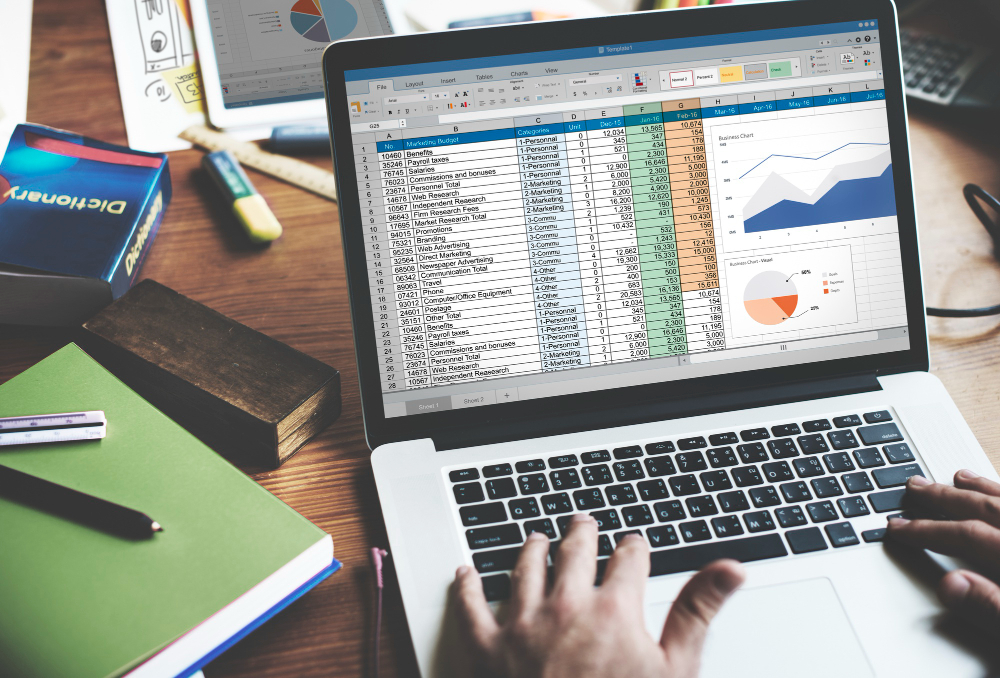Managing business finances with spreadsheets often feels convenient at first. They are flexible, widely available, and familiar to most teams. However, as businesses expand, spreadsheets become harder to manage, leading to inefficiencies, errors, and missed opportunities for smarter financial planning.
Modern budgeting tools offer automation, accuracy, and real-time collaboration that spreadsheets cannot match. With the right solution, businesses save time, reduce mistakes, and gain deeper financial insights. Switching from manual spreadsheets to budgeting software is no longer optional; it’s a necessity for growth.

How Spreadsheets Limit Financial Management
Spreadsheets often start as a practical solution, but they lack the sophistication required for long-term financial planning. Errors from manual data entry, formula mistakes, or version control issues can create serious financial risks. Teams spend more time fixing problems than analyzing opportunities.
As businesses scale, the budgeting and forecasting limitations of spreadsheets become more apparent, creating obstacles for accurate financial planning. Data becomes harder to track, and collaboration slows down because files must be updated and shared manually. Instead of supporting financial growth, spreadsheets turn into a burden that holds back progress.
Why Businesses Are Moving Toward Budgeting Software
Companies are increasingly recognizing the need for advanced tools that simplify financial planning. Switching to business budgeting software helps organizations cut down on errors while enabling real-time visibility into budgets, forecasts, and cash flow. Unlike spreadsheets, these tools integrate with accounting platforms and centralize all financial data.
Budgeting software also creates efficiency by automating repetitive calculations and providing accurate projections. This shift empowers decision-makers to focus on strategy rather than spending valuable time on manual updates or troubleshooting broken formulas.
What Advantages Does Budgeting Software Bring
Budgeting software delivers multiple advantages that directly impact efficiency, accuracy, and growth. Businesses gain access to predictive insights, real-time updates, and flexible forecasting features that are not possible with spreadsheets. These advantages of budgeting software highlight why it outperforms spreadsheets in efficiency, accuracy, and financial forecasting:
Improved Accuracy in Financial Data
Software eliminates the risks associated with manual inputs and ensures that financial figures remain consistent. Built-in checks, automated calculations, and integration with accounting systems reduce costly errors and improve trust in financial reports.
Real-Time Collaboration for Teams
Budgeting software allows multiple team members to work on the same platform without worrying about version conflicts. Everyone sees updates instantly, which speeds up decision-making and keeps the finance team aligned with company goals.
Smarter Forecasting and Planning
Modern budgeting solutions use predictive analytics to help businesses anticipate future trends. They highlight risks and opportunities, making it easier to plan for different scenarios with confidence and agility.
How Budgeting Software Improves Time Efficiency
Spreadsheets require significant manual effort, from data entry to formatting. Budgeting software automates these repetitive tasks, saving finance teams hours each week. This efficiency creates more time for strategic planning and less time spent fixing errors or chasing updates.
Automation also reduces dependency on single individuals who understand complex formulas, making processes easier to manage across the organization. By streamlining operations, businesses can focus on expansion instead of being slowed down by outdated methods.
What Security Risks Are Reduced with Budgeting Software
Financial data stored in spreadsheets is vulnerable to unauthorized access and accidental sharing. Software solutions provide stronger protection through user permissions, encryption, and audit trails. These features safeguard sensitive business information and reduce the likelihood of data breaches.
Additionally, budgeting platforms often offer secure cloud storage, ensuring financial records are backed up and accessible only to approved users. This level of security builds confidence that sensitive data remains private while still being available when needed.

How Integration Strengthens Financial Insights
Spreadsheets work in isolation, requiring manual imports and exports to gather data from other systems. Budgeting software integrates seamlessly with accounting, payroll, and invoicing tools. This creates a single source of truth, ensuring accuracy across all financial processes.
When data flows automatically between systems, reports become more reliable, and insights are easier to access. Leaders can base decisions on up-to-date financial information rather than outdated or incomplete numbers from a spreadsheet.
What Cost Savings Businesses Achieve with Budgeting Software
Investing in budgeting software may seem like an added expense, but it pays for itself quickly. Reduced errors prevent financial losses, automation saves time, and accurate forecasting prevents costly surprises. Businesses also save on labor by minimizing manual tasks.
These savings extend beyond the finance department, helping all teams work more efficiently. By reducing wasted time and financial risks, budgeting software contributes directly to profitability while giving leaders confidence in the accuracy of their financial outlook.
When to Make the Switch to Budgeting Software
The best time to switch is when spreadsheets no longer support the pace of your business growth. Warning signs include frequent errors, difficulty managing multiple contributors, or an inability to forecast accurately. If these issues are slowing your decision-making, software is the logical next step.
Early adoption allows businesses to scale faster without financial bottlenecks. Waiting too long increases the risks of mismanagement, wasted resources, and missed opportunities that could have been avoided with a modern budgeting solution.
FAQs
Why are spreadsheets unreliable for budgeting?
Spreadsheets rely heavily on manual inputs, which increases the risk of errors. They also lack automation, security, and real-time updates, making them less reliable for managing complex financial data as a business grows.
Can small businesses benefit from budgeting software?
Yes, small businesses benefit greatly because software reduces manual work and enhances accuracy. Even for smaller budgets, automation and forecasting features help owners make informed decisions without relying on complicated spreadsheets.
How does budgeting software improve decision-making?
Budgeting software provides real-time data, accurate forecasts, and scenario planning tools. Leaders can analyze trends quickly, respond to risks effectively, and make informed choices that align with business objectives.
Is budgeting software expensive to implement?
Most providers offer scalable pricing models, making it affordable for businesses of all sizes. While there is an initial cost, the savings in time, error reduction, and better financial planning often outweigh the expense.
Conclusion
Switching from spreadsheets to budgeting software transforms financial management by improving accuracy, collaboration, and forecasting. Businesses that embrace this technology reduce risks, save valuable time, and strengthen long-term growth. With a reliable financial system in place, organizations are better prepared for confident decision-making and sustainable success.


Leave a Reply